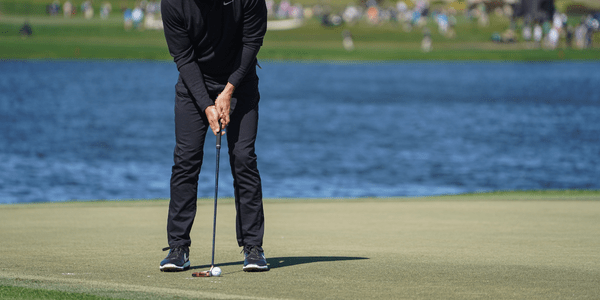
Control Your Emotions Throughout Your Game
How do you grade yourself on the ability to manage your emotions during a round of golf?
You may grade yourself pretty high, but would your grade remain the same after driving your ball into a sand trap?
Managing your emotions is a crucial mental skill for all golfers. Even on your best day, when everything seems to be breaking your way, the unexpected may happen.
* No matter how prepared you are, you will hit a bad shot once in a while.
* A bad day may still creep in even though you have played great golf in a string of tournaments.
* Unfortunate bounces can happen even when you are playing lights out early in the round.
In other words, golf is challenging, and things don’t always go as planned.
However, there are several aspects within your control during a competitive round. Focusing on controlling only these elements is crucial to playing your best.
- Attitude – Attitude is how you view yourself and the events around you. You can think of attitude as your perspective. You will feel more confident when you see yourself as talented or a hard worker. When you see an event as challenging rather than difficult, you are more likely to be persistent and motivated.
- Preparation, Effort, and Action – Quite simply, what you do and how you do it is fully under your control. You can choose to practice the least amount possible or go all in mentally, physically, and technically
- Focus – What you pay attention to is 100 percent controllable. You can focus on negative or positive thoughts. You can focus on external distractions or the current shot. You can focus on the process or outcomes. Also, you have the choice to focus on the past or present.
- Reaction – This is the big one for golfers. Your response to each shot sets the tone for the next shot.
When you let your emotions get the best of you, things can quickly go from bad to worse.
PGA player Guido Migliozzi knows precisely how your game can turn around instantly if you don’t control your reactions. Migliozzi won the 2022 French Open.
However, three weeks later, at the DP World Tour’s Nedbank Golf Challenge, Migliozzi experienced an epic collapse.
Migliozzi started Saturday’s round tied for third and two shots out of the lead. Then, on the par-4 17th hole, disaster struck: a tee shot into the fairway bunker, a shot that landed in the marsh and penalty area, two shots that were chunked, a ball that landed by a bulkhead, and a penalty drop.
The result was a sextuple-bogey 10. After just that one hole, Migliozzi fell 24 spots down the leaderboard into a tie for 27th place.
Retired Scottish professional golfer and commentator Ewen Murray commented on Migliozzi’s troubles.
MURRAY: “Everyone who has played the game has had moments like; [This is] a moment to somehow remain calm.“
When you can come to terms with “moments like this happen,” these moments will be less emotionally charged, and you will be more equipped to control your reactions.
Just as a recovery shot helps you get out of a tricky spot, taking a mental time out and a deep breath can help you recover from an emotionally challenging situation.
Take 2-3 deep breaths to calm your mind and relax your body. If you still feel upset and tense, repeat the deep breathing technique.
Also, keep in mind that a bad shot does not have emotion. You put the emotion into a bad shot. Change your reaction to change your emotion to the shot.
Related Golf Psychology Articles
- Helping Young Golfers Cope With Bad Shots
- Help Young Golfers Cope with Bad Shots
- How to Refocus After a Bad Shot
- Subscribe to The Golf Psychology Podcast on iTunes
- Subscribe to The Golf Psychology Podcast on Spotify
Get the Mental Edge – With Mental Training

Do you perform well in practice, but find yourself under-performing in games? Do you doubt your skills and second-guess yourself under pressure? If so, mental training will help you reach your goals in soccer. Many soccer players have the skill but are held back by low confidence and lack of pregame mental preparation!
You can get expert mental coaching with us from anywhere. Meet with us via Zoom, Skype, FaceTime or phone call. With today’s video technology, we are able to connect with athletes and coaches all over the globe.
Call Us Today to Schedule Your Free 15-Minute Session.
Find Out How You Can Benefit From One-on-One Mental Coaching!
888-742-7225 | 407-909-1700